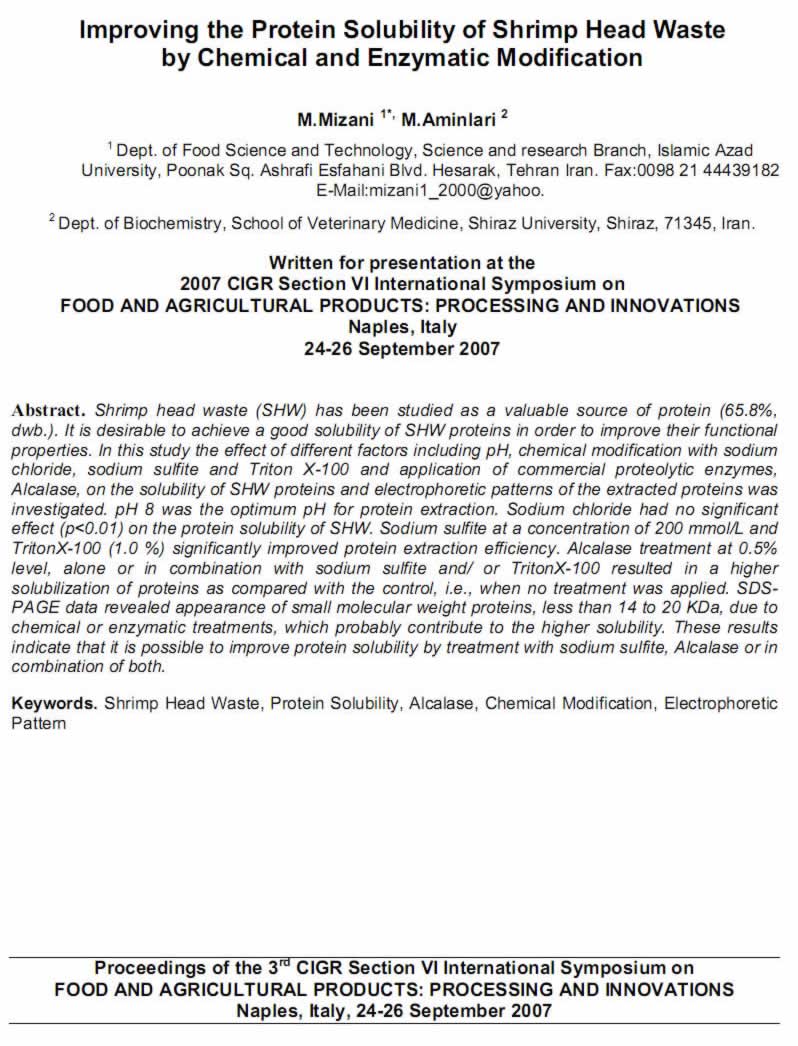 Improving the Protein Solubility of Shrimp Head Waste by Chemical and Enzymatic Modifications
Improving the Protein Solubility of Shrimp Head Waste by Chemical and Enzymatic ModificationsMizani, M; Aminlari, M; 2007; Improving the Protein Solubility of Shrimp Head Waste by Chemical and Enzymatic Modifications; 3rd CIGR Section VI International Symposium on FOOD AND AGRICULTURAL PRODUCTS: PROCESSING AND INNOVATIONS; 24-26 Sept; Naples, Italy.
Abstract: Shrimp head waste (SHW) has been studied as a valuable source of protein (65.8%, dwb.). It is desirable to achieve a good solubility of SHW proteins in order to improve their functional properties. In this study the effect of different factors including pH, chemical modification with sodium chloride, sodium sulfite and Triton X-100 and application of commercial proteolytic enzymes, Alcalase, on the solubility of SHW proteins and electrophoretic patterns of the extracted proteins was investigated. pH 8 was the optimum pH for protein extraction. Sodium chloride had no significant effect (p<0.01) on the protein solubility of SHW. Sodium sulfite at a concentration of 200 mmol/L and TritonX-100 (1.0 %) significantly improved protein extraction efficiency. Alcalase treatment at 0.5% level, alone or in combination with sodium sulfite and/ or TritonX-100 resulted in a higher solubilization of proteins as compared with the control, i.e., when no treatment was applied. SDS-PAGE data revealed appearance of small molecular weight proteins, less than 14 to 20 KDa, due to chemical or enzymatic treatments, which probably contribute to the higher solubility. These results indicate that it is possible to improve protein solubility by treatment with sodium sulfite, Alcalase or in combination of both.
Keywords: Shrimp Head Waste, Protein Solubility, Alcalase, Chemical Modification, Electrophoretic Pattern
Visit: 4159
Abstract: Shrimp head waste (SHW) has been studied as a valuable source of protein (65.8%, dwb.). It is desirable to achieve a good solubility of SHW proteins in order to improve their functional properties. In this study the effect of different factors including pH, chemical modification with sodium chloride, sodium sulfite and Triton X-100 and application of commercial proteolytic enzymes, Alcalase, on the solubility of SHW proteins and electrophoretic patterns of the extracted proteins was investigated. pH 8 was the optimum pH for protein extraction. Sodium chloride had no significant effect (p<0.01) on the protein solubility of SHW. Sodium sulfite at a concentration of 200 mmol/L and TritonX-100 (1.0 %) significantly improved protein extraction efficiency. Alcalase treatment at 0.5% level, alone or in combination with sodium sulfite and/ or TritonX-100 resulted in a higher solubilization of proteins as compared with the control, i.e., when no treatment was applied. SDS-PAGE data revealed appearance of small molecular weight proteins, less than 14 to 20 KDa, due to chemical or enzymatic treatments, which probably contribute to the higher solubility. These results indicate that it is possible to improve protein solubility by treatment with sodium sulfite, Alcalase or in combination of both.
Keywords: Shrimp Head Waste, Protein Solubility, Alcalase, Chemical Modification, Electrophoretic Pattern
Visit: 4159
design by: webcandy.ir
